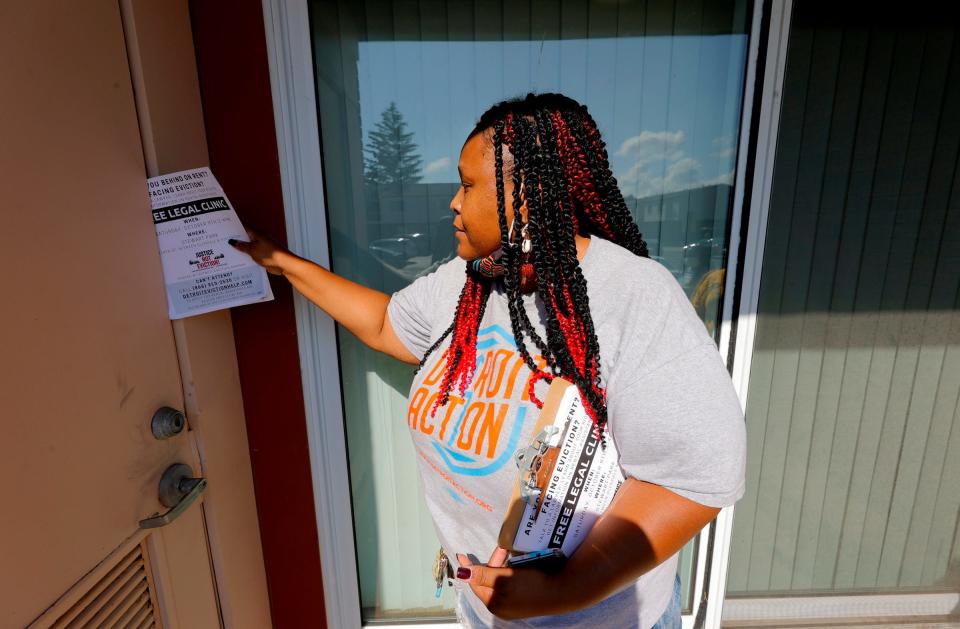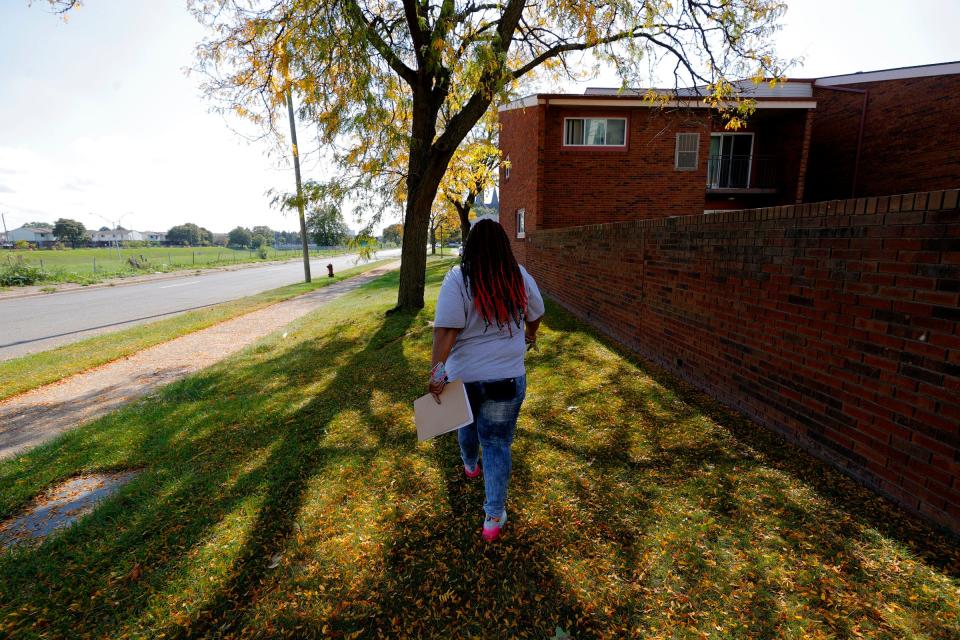This group is trying to save their neighbors from eviction before it's too late
Tenesa Sanders walks up to an apartment in Midtown Detroit on a Saturday afternoon, with clipboard in hand and flyers about a free legal clinic happening later that day for people facing eviction and ways to get rental assistance.
She buzzes in to try and reach the tenant, whom she says could be evicted this week, but gets no response.
“He needs this paperwork so bad," said Sanders, a renters and tenant organizer with local community organization Detroit Action, who is going door-to-door to get renters on the verge of eviction the help they need to stay housed.
Sanders leaves the materials on the tenant's patio. She hops into her car and drives off to the next apartment, hitting five more units that afternoon and leaving flyers where she can — slipped under doors, in lobbies and near mailboxes. All the while, she references a list of 159 addresses for people who could be evicted soon. She prefers talking to tenants directly and connecting them with resources, but on Saturday she didn't reach anyone.

“That’s all we can do," she says as she leaves materials near one mailbox, suggesting that residents may be out on a Saturday afternoon.
Sanders' door-to-door outreach is part of a broader push by a coalition of five Detroit nonprofits to connect renters with resources to stay housed, including funds to wipe away back rent and legal counsel. The group is taking a grassroots approach — leaving information at doors and working with local businesses — especially now that a moratorium on residential evictions that had been in place for roughly a year has been lifted, and millions of dollars in federal rent aid are available.
More: Volunteers find niche helping families leaving abuse, homelessness
"The resources are there for the moment. You have to connect the resources to the people," said Tonya Myers Phillips, director of community partnerships and development at the Sugar Law Center and public policy adviser for Michigan Legal Services, one of the organizations that is part of the outreach effort.
People may not know resources exist and they may lack internet access, she said, adding that the application process to tap into federal aid can be long and laden with paperwork.

"The overall goal is to reach Detroiters where they're at and to get information to Detroiters about eviction rental assistance that's available, legal representation that's available and also invite individuals and residents into the process for implementing long-term solutions in the city of Detroit," she said.
Five Detroit-based organizations received a $80,000 one-year grant from the National Low Income Housing Coalition in August to expand eviction prevention, as thousands of people in metro Detroit reported housing instability.
Between Sept. 15 and Sept. 27, more than 116,000 households in the Detroit, Warren and Dearborn areas said they could face eviction or foreclosure, according to the Census Bureau's Household Pulse Survey.
Last month, the city of Detroit — expecting a surge of eviction cases — launched a three-pronged plan to keep people housed: free legal counsel for tenants in court from six months to a year, federal dollars for past-due rent and utilities and a chance to find a job through a city program.
The 36th District Court has also said it anticipates an increase in eviction orders and new filings now that the moratorium is no longer in place. The U.S. Supreme Court in late August struck down the federal moratorium on evictions enacted during the COVID-19 pandemic, and later extended to give states more time to get billions of dollars in emergency rent aid out to tenants and landlords.
Nationally, the pace of getting relief dollars into the hands of tenants and landlords has been slow, although it picked up in August. Michigan has so far paid out $276 million of the $622 million allocated to the state earlier this year. More than 100,000 people have applied to a program to help with back rent and utilities, and roughly 44,000 applications were approved, according to the Michigan State Housing Authority, the agency responsible for allocating the dollars through housing agencies across the state.
Wayne County has consistently seen the lion's share of applications, with more than 35,000 people signing up for help.
Organizers describe evictions in Detroit prior to the pandemic as a "crisis" and say low-income renters need legal representation baked into the court process.
In 2019, more than 10,000 writs of eviction were signed in the 36th District Court and in 2020, that number dropped to 2,428, the court said in July. A study from the University of Michigan found that eviction filings in the pandemic — between April and December 2020 — fell 65%, compared with the same time in 2019. The decrease was because of safety nets such as eviction moratoriums, legal aid and rent assistance, researchers found in the June report.
The early days of the COVID-19 crisis — before there was an eviction moratorium and emergency funding — were chaotic and laced with panic, Phillips said.
"We're better, I think, stronger than we were at that time and if we don't continue on this path of shoring up our social safety and doing this outreach, I think we're headed back in that direction," she said.
On a Friday afternoon last month, a group of seven people canvassed more than 400 homes at the Martin Luther King apartments near downtown Detroit, leaving resources at doors.
The tenants in the public housing units were not necessarily at risk of eviction, but the organizers wanted to leave information in case the residents — or someone they knew — needed it, and to inform them about the Detroit Right to Counsel, a group seeking to guarantee legal representation for low-income renters facing eviction.
"We've had enough people leaving the city over the last 20 years. We've had too many people that have been displaced, a lot of times for reasons that are not their fault," said Evan Villeneuve, a tenant organizer with the United Community Housing Coalition and a member of Detroit Right to Counsel.
Advocates want Detroit to join other cities across the nation including Toledo, Ohio, and Philadelphia in providing legal counsel for low-income tenants. Nationally, 90% of landlords have attorneys in court, whereas 90% of tenants do not, sociologist Matthew Desmond noted in a 2015 policy brief.
"When you provide legal representation to individuals facing evictions, evictions go down," said Phillips, who is also a member of the Detroit Right to Counsel.
Some organizers are tapping into local businesses to get the word out about eviction prevention.
Gwendolyn Winston, co-director of the Detroit-based Wisdom Institute for women and girls, is working with a local gym, barbershop, men's suit shop and food pantry to distribute flyers with more information on ways to prevent eviction. Those businesses are well poised to help because they are trusted neighborhood gathering spots, she explained.
"One person evicted is a family evicted," Winston said.
For Sanders of Detroit Action, the push to keep people housed is personal.
"I was that person," she said after a couple hours of door-to-door outreach on Saturday.

Sanders "couch hopped" for two years, staying with friends and family. At the time, she had trouble finding jobs because her fibromyalgia would flare up.
"I felt incompetent. I felt like I just couldn't get it together. But I just kept praying," said Sanders, 48, of Detroit. It was the first time she had dealt with any kind of homelessness.
Eventually, through a local nonprofit, she found temporary supportive housing in 2018.
"You need housing just to do daily living," she said. "If you have children, they have to have somewhere safe to do their homework, sleep and wash up and eat adequately. And then seniors, they need safe places to go. Everyone needs to be housed. Housing should be a human right to every living soul no matter if you have money or not."
More: Inmate program that ships food to needy school kids hits major milestone
This article originally appeared on Detroit Free Press: Detroit Action group tries to save renters from eviction

